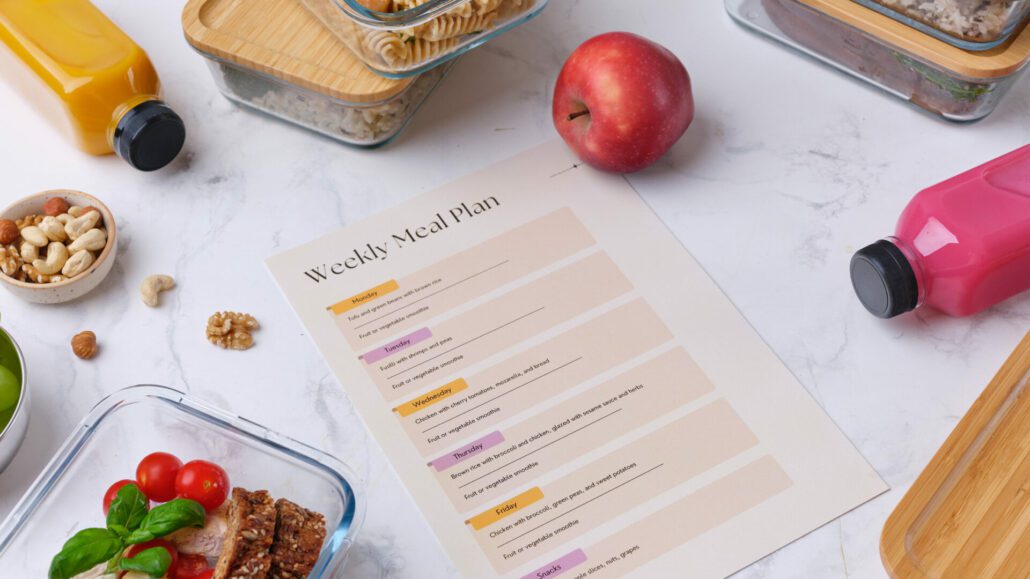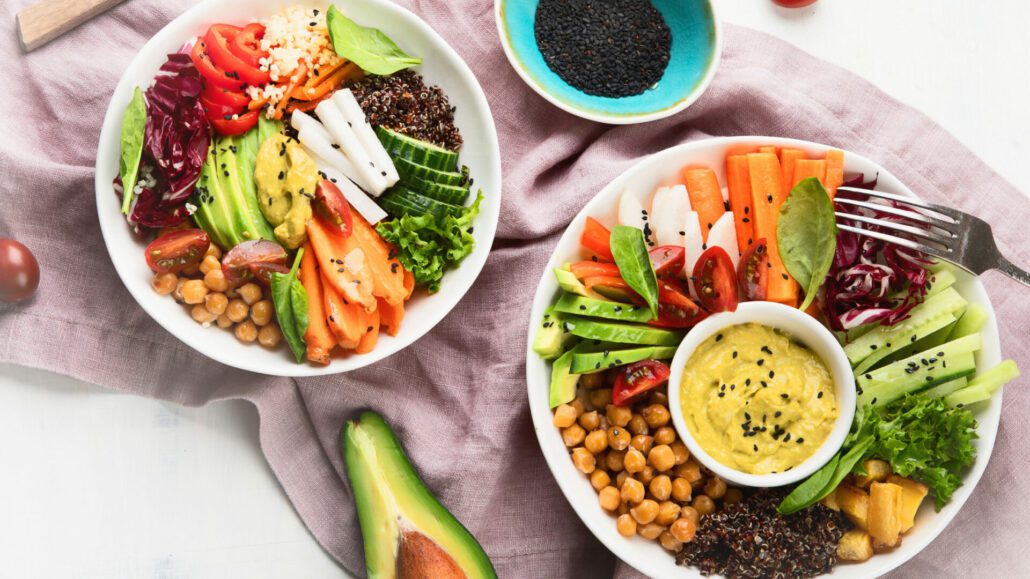Meal Planning 101: Boost Your Health, Save Time, and Simplify Your Life

In today’s fast-paced world, where time seems to slip through our fingers, and maintaining a healthy lifestyle becomes increasingly challenging, one solution stands out: meal planning. Whether you’re a busy professional, a parent juggling multiple responsibilities, or someone striving to improve their overall well-being, planning meals ahead of time can be a game-changer. By taking a proactive approach to your meals and incorporating the principles of organization and foresight, you can experience a multitude of benefits. In this article, we will take a look at the world of meal planning, diving head-first into its incredible advantages and showing you how it can revolutionize your life.
Exploring Meal Planning
Before we dive into the benefits and applications of meal planning, let’s understand what it entails. Meal planning is the practice of deliberately organizing and preparing meals in advance. It involves thoughtful consideration of nutritional needs, portion sizes, and the coordination of ingredients to create balanced and enjoyable meals throughout the week.
Healthy Benefits
When it comes to maintaining a healthy lifestyle, meal planning reigns supreme. By taking control of what goes into your body, you can make conscious choices that support your well-being. One of the most significant advantages of meal planning is the ability to ensure balanced nutrition in every meal. By carefully selecting a variety of fruits, vegetables, whole grains, lean proteins, and healthy fats, you can create meals that provide all the necessary nutrients your body needs.
Research has shown that individuals who engage in regular meal planning tend to consume fewer processed foods and have a higher intake of essential nutrients compared to those who rely on spontaneous meal decisions. Additionally, meal planning allows you to control portion sizes, helping you avoid overeating and maintain a healthy weight.
Time-Saving Strategies
Time is a precious commodity, and meal prep is here to help you reclaim it. Rather than spending hours each day wondering what to cook or running to the grocery store multiple times a week, effective meal planning allows you to streamline your cooking process and save valuable time.
To maximize efficiency, start by designating a specific day each week for meal planning and preparation. Create a meal schedule, outline the recipes you’ll be cooking, and compile a comprehensive grocery list. By doing so, you can minimize last-minute trips to the store and avoid the frustration of missing ingredients.
Another time-saving strategy is batch cooking. Prepare larger portions of meals and store them in individual servings for later use. This approach allows you to have ready-to-eat meals on hand, reducing the time spent cooking on busy weekdays. Investing in quality food storage containers will help you keep your meals fresh and organized.
Tips for Busy Individuals
For busy individuals, finding time to cook can feel like an impossible task. However, with the right approach, even the busiest schedules can accommodate meal planning. Here are some tips to help you navigate the challenges:
- Plan for the week ahead: Take a few minutes at the beginning of each week to map out your meals. Consider your schedule, including work commitments, family activities, and personal obligations. This way, you can anticipate busier days and plan for quick and easy meals during those times.
- Embrace make-ahead meals: Dedicate a portion of your weekend to preparing meals for the upcoming week. Cook in bulk and portion out your meals into individual containers. This way, you can simply grab a pre-made meal from the fridge or freezer and have a delicious, home-cooked dinner ready in minutes.
- Utilize slow cookers and instant pots: These appliances can be a busy individual’s best friend. With minimal effort, you can toss in the ingredients in the morning, set the timer, and come home to a hot and flavorful meal in the evening. Slow cookers and instant pots are perfect for soups, stews, and even tender meats that can be used in various dishes throughout the week.
Benefits and Applications of Meal Prepping
Now that we’ve explored the practical aspects, let’s delve into the multitude of benefits it offers and its wide-ranging applications.
Meal Prepping for Weight Loss
If you’re on a weight loss journey, meal prepping can be a powerful tool to support your goals. By prepping and portioning your meals in advance, you have greater control over your calorie intake and can make healthier choices. With meal planning, you can ensure that each meal is packed with nutrients and appropriately portioned to align with your weight loss plan.
Consider the story of Sarah, who struggled with portion control and impulse eating. Sarah decided to incorporate prepping into her routine, focusing on high-protein, fiber-rich meals. By doing so, she found it easier to resist unhealthy snacks and stay on track with her weight loss goals. With the aid of meal planning, Sarah successfully lost 20 pounds and regained control of her eating habits.
Family Meal Planning Made Easy
Meal planning is not only beneficial for individuals but also for families. By involving your family in the meal planning process, you can foster healthy eating habits, encourage variety, and save both time and money.
Take the example of the Johnson family. With two working parents and three children, mealtime used to be chaotic and filled with unhealthy takeout options. They decided to implement meal prepping as a family project. Each week, they would gather to select recipes, create a shopping list, and even allocate cooking duties to each family member. The result? The family bonded over meal preparation, and the children became more engaged in the cooking process. Not only did they enjoy healthier meals, but they also saved money by reducing their reliance on expensive takeout options.
Meal Prep Recipe Ideas

One of the joys of meal planning is the opportunity to explore a wide array of delicious and nutritious recipes that can be prepped in advance. Here are a few meal prep ideas to inspire your culinary adventures:
- Chicken and Vegetable Stir-Fry: Slice chicken breast into thin strips and stir-fry with a medley of vegetables such as bell peppers, broccoli, and snap peas. Season with soy sauce, garlic, and ginger for a flavorful touch. Divide the stir-fry into individual containers and serve with cooked rice or noodles for a quick and satisfying meal.
- Baked Sweet Potato and Black Bean Tacos: Wrap sweet potatoes in foil and bake until tender. Mash the sweet potatoes and combine them with black beans, diced tomatoes, and spices like cumin and chili powder. Warm tortillas and spoon the sweet potato and black bean mixture onto them. Top with your favorite taco toppings like salsa, avocado, and cilantro. Prepare several tacos and store them in containers for easy grab-and-go lunches.
- Pasta Salad with Veggies and Italian Dressing: Cook your choice of pasta, such as penne or rotini, according to package instructions. In a large bowl, combine the cooked pasta with cherry tomatoes, cucumbers, black olives, and diced red onions. Toss with Italian dressing and sprinkle with feta cheese. Portion the pasta salad into containers for refreshing and filling lunches throughout the week.
- Turkey or Veggie Wrap: Spread a whole-wheat wrap or tortilla with your favorite spread, such as hummus or avocado. Layer with sliced turkey or roasted vegetables, along with fresh lettuce, tomatoes, and cucumbers. Roll up the wrap tightly and secure with toothpicks. Make several wraps and store them in the fridge for convenient and portable lunches or snacks.
These practical and easy-to-make meal prep recipes offer a balance of flavors and nutrition without requiring elaborate ingredients or cooking techniques. They are designed to fit seamlessly into busy lifestyles while still providing nourishing and tasty meals.
Challenges and Future Trends
While meal planning offers numerous benefits, it’s essential to address the potential challenges and explore the future trends that can further enhance the prepping experience.
Overcoming Obstacles
One common challenge in meal planning is finding the time and motivation to start. It can feel overwhelming, especially if you’re not accustomed to planning your meals in advance. To overcome this obstacle, start small. Begin by planning just a few meals each week and gradually increase as you become more comfortable with the process. Additionally, explore resources such as meal planning apps, online recipes, and meal planning communities that can provide inspiration and guidance.
Another challenge is maintaining variety and avoiding meal fatigue. Eating the same meals week after week can become monotonous and discouraging. To combat this, focus on experimenting with different flavors, cuisines, and cooking techniques. Engage with online recipe communities or join a local cooking class to discover new recipes and keep your meals exciting.
The Future of Meal Planning: Technology and Customization
As technology continues to advance, it brings new possibilities for the world of meal planning. Meal prepping apps have gained popularity, allowing users to create personalized meal plans, generate shopping lists, and even track nutritional information. These apps streamline the process, making it more accessible and convenient for individuals of all skill levels.
Moreover, customization is emerging as a key trend in meal planning. With the help of artificial intelligence and data analysis, meal planning services can tailor recommendations to an individual’s dietary preferences, allergies, and nutritional goals. This level of personalization ensures that meal plans are not only healthy but also enjoyable and sustainable in the long term.
Conclusion
Meal planning is a transformative practice that can positively impact your health, save you valuable time, and simplify your life. By taking a proactive approach to your meals, you can enjoy the benefits of balanced nutrition, portion control, and the convenience of having ready-to-eat meals on hand.
While there may be challenges along the way, such as finding the time and maintaining variety, these obstacles can be overcome with perseverance and the support of online resources and communities. Additionally, the future of meal planning looks promising with the integration of technology and customization, offering even greater convenience and personalization.
So, why wait? Start incorporating meal prepping into your routine today. Begin by setting aside a small amount of time each week to plan and prep your meals. Experiment with new recipes, involve your family, and explore the numerous resources available to make the process enjoyable and sustainable.
Unlock the power of meal planning and experience the transformative benefits it can bring to your health, time management, and overall well-being. Take the first step towards a healthier, more organized lifestyle and simplify your life with the magic of meal planning.
Happy eats!
Tony has a bachelor’s degree from the University of Phoenix and over 14 years of writing experience between multiple publications in the tech, photography, lifestyle, and deal industries.








Leave a Reply
Want to join the discussion?Feel free to contribute!